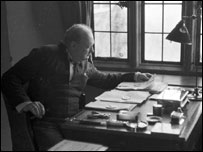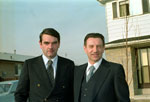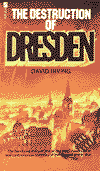| [images and
captions added by this website] 
Toronto, Ontario, March 22, 1979
 Features
- Books Features
- Books
Winston seen
with positive venom by William
French DAVID Irving was still in
diapers when the Second World War began, but that
minor inconvenience hasn't prevented him from
becoming an internationally recognized authority on
the conflict. After all, Gibbon never
visited the Roman Empire, but he still became
something of an expert on its decline and
fall. In fact, an argument can be made that the
generals and politicians who were involved in the
1939 to 1945 war had vested interests and fixed
positions to defend in their memoirs. No one can
accuse Irving of being a similar purveyor of
conventional wisdom; his eight books so far on the
subject, including a
revisionist view of Hitler and a
biography of Rommel that has been on the
bestseller list in Germany for the past five
months, have been provocative, controversial and -
in one case - libelous. His forthcoming
biography of Winston Churchill will have
at least some of those characteristics. It will be 95-per-cent positive and 5-per-cent
pure venom, Irving said in Toronto the other day,
hinting at startling revelations. The book won't
make me any friends.  Irving,
who lives at a fashionable address in London's West
End, as befits an author in the 90-per-cent tax
bracket, was in Toronto as part of his research on
another book, a history of the 1956
Hungarian revolution. A key member of the
Budapest police department during the revolt
[Sandor Kopacsi, right] now lives
here, and Irving believes he has quite a story to
tell. The man had already refused Irving's request
by mail to be interviewed, but Irving came anyway,
planning to camp on his doorstep. It's that kind of
dogged determination that enabled him to find
Rommel's diaries when no one else could, and led
The Times of London to acclaim him as one of
Britain's foremost historians. He is not only
relentless but thorough; for his biography of
Churchill, for example, he has been all through the
Mackenzie King diaries in Ottawa, to see
what King thought about the British prime minister.
(He frowned on Churchill's drinking at the Quebec
conference.) Irving,
who lives at a fashionable address in London's West
End, as befits an author in the 90-per-cent tax
bracket, was in Toronto as part of his research on
another book, a history of the 1956
Hungarian revolution. A key member of the
Budapest police department during the revolt
[Sandor Kopacsi, right] now lives
here, and Irving believes he has quite a story to
tell. The man had already refused Irving's request
by mail to be interviewed, but Irving came anyway,
planning to camp on his doorstep. It's that kind of
dogged determination that enabled him to find
Rommel's diaries when no one else could, and led
The Times of London to acclaim him as one of
Britain's foremost historians. He is not only
relentless but thorough; for his biography of
Churchill, for example, he has been all through the
Mackenzie King diaries in Ottawa, to see
what King thought about the British prime minister.
(He frowned on Churchill's drinking at the Quebec
conference.)
Irving became a bestselling author quite by
accident. In 1959, when he was 21, he went to
Germany to become competent in the language. He had
studied physics and economics at the University of
London, but had no career in sight. Working in a
steel mill in the Ruhr, he met a German who had
been through the saturation
firebombing of Dresden, and Irving was
fascinated. He realized that hardly anyone in
Britain was aware of the raid, which was more
devastating than Hiroshima, and decided to write a
newspaper story about it. But his research grew and grew and became a book,
The Destruction of Dresden, in which he vividly
recreated the raid and condemned those responsible.
It has sold more than a million copies since it was
published in 1963.
But his research grew and grew and became a book,
The Destruction of Dresden, in which he vividly
recreated the raid and condemned those responsible.
It has sold more than a million copies since it was
published in 1963. Irving, still looking for a career, sensed there
might be more wartime rubble he could pick through
profitably. There followed
books on the Luftwaffe, the German
attempts to develop an atomic bomb, British
inability to stop development of the V-1 and V-2
rockets, the mysterious
death of the Polish leader, Gen. Sikorski, in a
plane crash at Gibraltar -- Irving's research was
used by
Rolf Hochhuth in his controversial play
The Soldiers - and the massive biographies
of Hitler and
Rommel. In one of the books,
The Destruction of Convoy PQ-17, he
described one of the most disastrous naval
engagements of the war, in which a British convoy
en route to Murmansk was almost wiped out. He
blamed the escort commander, Capt. Jack
Broome, for the miscalculation that led to the
debacle. Broome sued for libel on the basis that he
was carrying out orders from the Admiralty, and in
1970 was awarded $96,000 in damages, the
second-highest libel award in Britain at the time,
plus court costs. Irving paid off the last
instalment two months ago. His biography of Hitler, published in 1977, was
hardly less controversial. He claimed that Hitler
was not the indomitable Führer of legend, but
one of the weakest leaders Germany has had this
century. He claimed that many important decisions
attributed to him were taken by underlings, without
his knowledge, including the decision to
exterminate the Jews. Hitler, he argued, was aware
that the Jews were in concentration camps, but had
no knowledge of the final solution. His belief is
based in part on the fact that no extermination
order from Hitler was ever found, although the
meticulous Germans kept all his other orders. His
theory raised a storm of protest from those who
regard Hitler as the personification of evil, but
Irving says many German historians now accept his
view.  During
the research for a book [
The Mare's Nest] in 1964, Irving discovered
one of the best-kept secrets of the war, the fact
that the British had cracked the German secret
code. The Ultra Secret, as it has since become
known, explained many puzzling events, and Irving
immediately recognized its importance. But when his
book was submitted to the Cabinet for routine
approval, two trench-coated gentlemen showed up at
his flat for a talk, and two more called on his
publisher. During
the research for a book [
The Mare's Nest] in 1964, Irving discovered
one of the best-kept secrets of the war, the fact
that the British had cracked the German secret
code. The Ultra Secret, as it has since become
known, explained many puzzling events, and Irving
immediately recognized its importance. But when his
book was submitted to the Cabinet for routine
approval, two trench-coated gentlemen showed up at
his flat for a talk, and two more called on his
publisher.
They wanted all reference to the Ultra secret
removed, and
although Irving was not covered by the Official
Secrets Act, he complied. He believes the
reason for the government's action was that it had
sold the decoding machines to new African states,
and was able to monitor all their coded traffic,
unknown to them. The
book about the Hungarian revolution will be
Irving's first that is not about the Second World
War. Why the change? I was afraid I was getting in
a rut, and wanted to see if I could do something
else, he said. I'm afraid people will soon throw up
their hands and say, 'Oh no, not another book about
the second war.' That's highly unlikely, as long as
Irving keeps stirring up the ashes. |